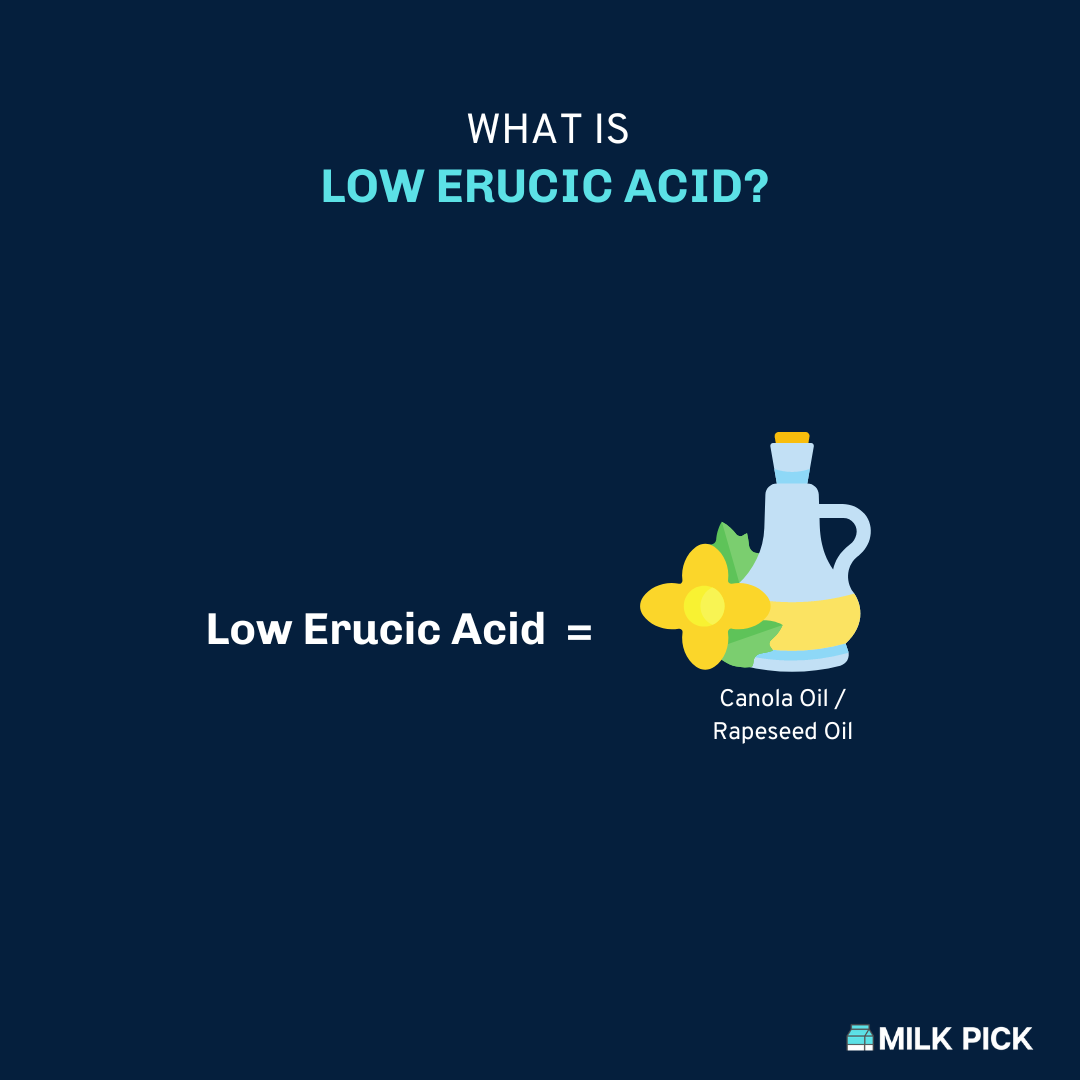It can be scary to flip over your almond milk carton and find a long list of ingredients you don’t recognize.
I mean, almond milk should just be almonds and water, right?
In theory, yes, but there’s lots of almond milk on the shelf with numerous additives you don’t recognize. One of these additives is low erucic acid.
This article will tell you everything you need to know about low erucic acid, what it’s doing in your almond milk, and if you should avoid it.
What Is Low Erucic Acid?
Low erucic acid is a monosaturated omega-9 fatty acid found in oil-rich seeds like mustard seeds and rapeseed. Rapeseed oil, for example, is said to be comprised of anywhere from 30-60% low erucic acid.
You’ll probably find low erucic acid in your food in the form of either canola oil or rapeseed oil.
Canola oil and rapeseed oil are used interchangeably in the UK due to the role rapeseed played in the creation of the canola plant. But in the US, you’ll likely hear it referred to as canola oil.
For the sake of this article, we will use rapeseed oil and canola oil interchangeably.
Historically, the rapeseed plant was a drought-resistant crop, but the high levels of naturally occurring erucic acid were found to be toxic in high doses.
To combat the adverse health outcomes, scientists in the 1970s genetically modified rapeseed plants through cross-breeding to create a plant with lower levels of erucic acid.
In doing so, they created the canola plant and canola oil.
According to the FDA, low erucic acid is safe in small amounts.

Why Is Low Erucic Acid in Almond Milk?
You likely won’t find low erucic acid in your almond milk ingredient list - but that doesn’t mean it isn’t there.
If the ingredient list has canola or rapeseed oil, there’s low erucic acid in your almond milk.
The main reason companies use canola oil in almond milk is to give it a creamier texture.
While common in almond milk, you’re more likely to find canola oil in oat milk used for coffee (i.e., barista oat milk) because this allows the milk to froth like cow milk.
Related: How to Froth Almond Milk
Is Canola Oil Good for You?
Canola oil no longer contains dangerously high levels of erucic acid, so why does it matter if it’s in your almond milk?
There’s a lot of debate about whether or not canola oil is healthy or should be avoided. Canola oil is generally considered a “healthy” oil because it’s low in saturated fat.
On the other hand, canola oil has a high omega-6 fat content.
While omega-6 fats are vital to your health, most people get plenty of it from their diets. And high levels of omega-6 are known to cause inflammation.
In fact, several animal studies have linked canola oil to increased inflammation.
In addition to animal studies linking canola oil to increased inflammation, animal studies have also shown that canola oil is linked to memory issues and weight gain.
Finally, some studies show that canola oil negatively impacts heart health, while others show a positive impact. The actual effect of canola oil on heart health is unclear.
When it comes to determining if canola oil is healthy or not, there’s evidence to support both sides.
Like most things, it’s up to you to decide if canola oil is a healthy addition to your diet.
The Downside of Almond Milk with Canola Oil
The most common reasons people choose to avoid almond milk with canola oil are:
- It's a GMO
- It's highly refined
GMOs
Genetically Modified Organisms (GMOs) are organisms whose DNA, or genetic material, has been altered in a way that doesn’t occur in nature.
About 90% of canola plants are genetically modified.
It’s still unclear if the long-term effects of GMOs will negatively impact health, but some people choose to avoid GMOs regardless.
Highly Refined Oil
Canola oil production requires high heat and exposure to chemicals, which makes canola oil a highly refined oil.
The process of refining oil can strip the oil of natural nutrients. Refined oils are also known to cause inflammation in high quantities.
Here's a video that details how canola oil is made.
Should You Avoid Almond Milk With Low Euric Acid / Canola Oil?
As always, we recommend almond milk with clean ingredients, which means we don’t recommend canola oil.
Even more, canola oil isn’t a necessary ingredient in almond milk. Plenty of brands make delicious almond milk without low erucic acid.
While we generally recommend almond milk without additives like canola or rapeseed oil, we recognize that the studies surrounding them are still inconclusive.
At the end of the day, drinking almond milk with canola oil is a decision you’ll have to make for yourself.
